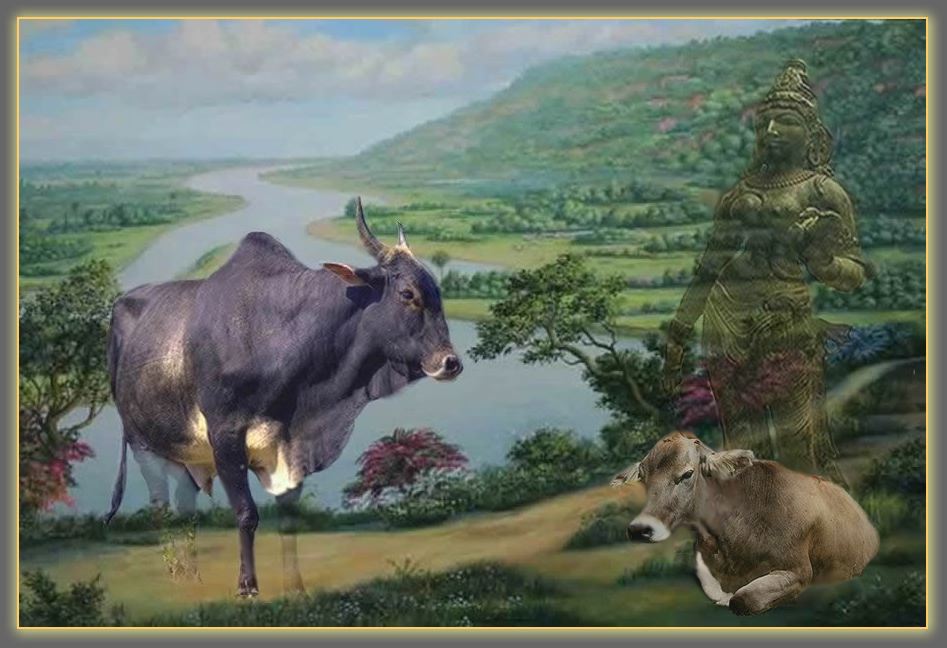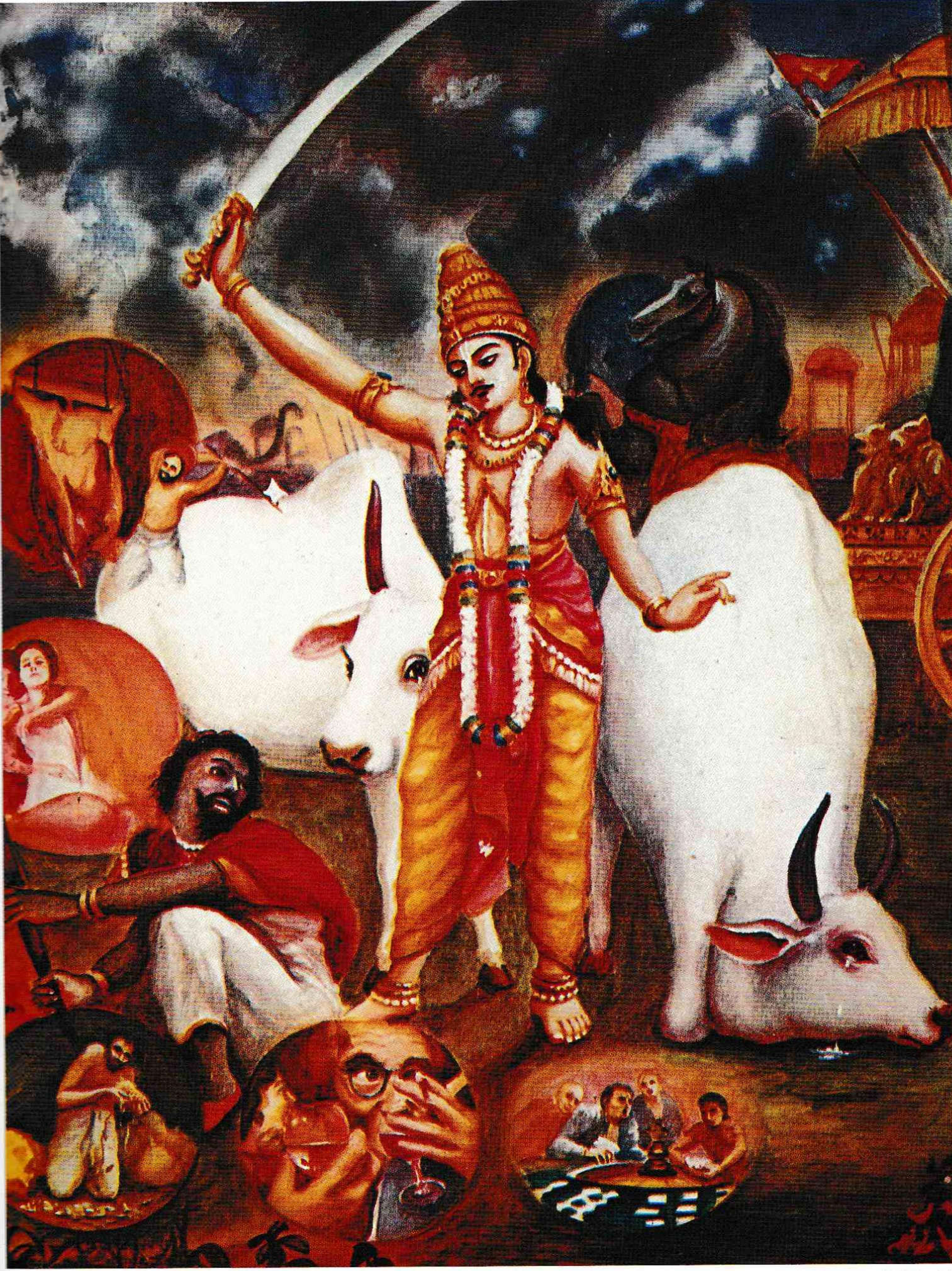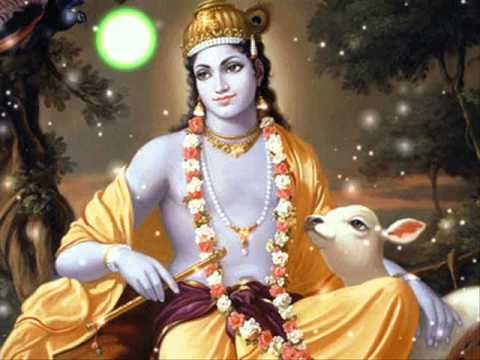
Srimad Bhagavatam Canto 1, Chapter 3, Verses 25 – 31
The three legs missing are austerity, cleanliness and mercy with truthfulness, the first quality in this list, as the only leg left standing due to Kali Yuga’s influence of rampant lust, intoxication and haughtiness upon the planetary population.
thanks to https://bhagavata.org/canto1/chapter16.html for this translation (revised slightly) and top image as well to A. C. Bhaktivedanta Swami Prabhupada / Krishna Books for other insights and images; thanks to this site for digitalized devanagari text: https://sanskritdocuments.org/doc_purana/bhagpur.html
धरण्युवाच भवान्हि वेद तत्सर्वं यन्मां धर्मानुपृच्छसि चतुर्भिर्वर्तसे येन पादैर्लोकसुखावहैः
(25)Mother Earth replied: ‘Oh Dharma, I will do my best to answer all the questions you asked me, for you are with your four legs [the vidhi] present in all the worlds to bring happiness.

सत्यं शौचं दया क्षान्तिस्त्यागः सन्तोष आर्जवम्
शमो दमस्तपः साम्यं तितिक्षोपरतिः श्रुतम्
ज्ञानं विरक्तिरैश्वर्यं शौर्यं तेजो बलं स्मृतिः
स्वातन्त्र्यं कौशलं कान्तिर्धैर्यं मार्दवमेव च
प्रागल्भ्यं प्रश्रयः शीलं सह ओजो बलं भगः
गाम्भीर्यं स्थैर्यमास्तिक्यं कीर्तिर्मानोऽनहङ्कृतिः
एते चान्ये च भगवन्नित्या यत्र महागुणाः
प्रार्थ्या महत्त्वमिच्छद्भिर्न वियन्ति स्म कर्हिचित्
तेनाहं गुणपात्रेण श्रीनिवासेन साम्प्रतम्
शोचामि रहितं लोकं पाप्मना कलिनेक्षितम्
(26-30) Truthfulness, cleanliness, compassion, self-control, magnanimity, contentment, straightforwardness, concentration, sense control, responsibility, equality, tolerance, equanimity and loyalty. And certainly also knowledge, detachment, leadership, chivalry, influence, power, dutifulness, independence, dexterity, beauty, serenity and kindheartedness, as also ingenuity, gentility, mannerliness, determination, knowledgeability, propriety, pleasantness, joyfulness, immovability, faithfulness, fame and dignity – all these and many others are the most important everlasting qualities of the Supreme Lord, the never ever diminishing higher nature desired by those wishing for His greatness. I am thanks to Him, the reservoir of all qualities and the home of the goddess of fortune, myself such an abode, but I lament now that in His absence, Kali, the source of all sins, is seen all over the world. (31) I am lamenting both for me and for you, for the best of the enlightened souls, the gods and the ancestors in heaven, the sages and the devotees, as also for all people in their status orientations in society.

Here’s the “LIST” of 40 qualities we ALL should strive for!
Whether you believe Christ, Kṛṣṇa, Buddha, Allah, the Great Spirit or even just plain ole regular almighty God Him/Herself in Heaven,
It appears as a planet, our collective national/racial group karma has bound us all together in such a way that the keenly perceptive truth in jest states bluntly: our “Karma done run over our Dogma”.
Let’s be clear.. Dharma is something you “live” and by doing so, grow together, shine and evolve as a planetary population. it’s not a set of rules, names nor nuggets of history that are meant to be debated with the victors imposing their version even to the death.
40 Sanskrit words. These words are imbued with the meanings they contain, therefore just reading them into your mind once or twice is a good prescription for invoking/enhancing said qualities in ourselves.
Pronunciation tips:
A = Normal “a” sounds like short “a” in English, so like “a [word-that-starts-with-a-consonant]” or “mum”. First word could be written phonetically in English as “sutt-yum” .
Long “ā” with a line over the top sounds like “Ah” (I knew that), or the “a” in “father” (Bostonians should ignore that last hint, just go with “ah”!)
C = Regular looking “c” but don’t be deceived, “c” in Latinized Sanskrit sounds like “CH” ALWAYS. So every time you see a “c” think “CH” in both the front and back ends of church as well as the children, but don’t mention the choir, the accepted method of transcribing Devanagari (their alphabet.. means “city of the gods”) into Latinized letters always uses a regular old “k” for that sound, and a plain old “s”is the only letter for the sound of “c” in “center”.
S = 3 kinds … normal “s” is just like in English the other too are more like “sh”. When it has a slash over the top like this “ś” it’s like the “sh” in the word “rush” or (may the) “Schwartz” (be with you), a bit harsher than the softer sounding “sh” which here has a dot underneath, “ṣ”, which sounds like the “sh” in “sheen” same sound you hear in Hare Krishna.
ṁ with a dot over it has a nasal ring at the end, kind of like a cross between “m” the way a proper English “Tom” might be called by his mum with the “ng” in “bong”. Varies by word and referenced pundit.
ḥ gives a slight breath echoing the previous vowel afterwards if it appears on the end of a word when treated separately or a line of text
Syllables are either long or short. Unadulterated “a”, “i”, “e” and “u” with those last sounding just like in English “pit”, “pet” and “put” are all short. Except for strange vowel “ṛ” in Hare Kṛṣṇa any other vowel or combination is long and held twice as long as the short ones. So “i” with a line over the top “ī” sounds like “ee”, “ū” sounds like “oo”, “ai” same as English, “au” sounds like “ow” in “pow”. All syllables are unaccented with the short/long sequences giving the only semblance of the prominent feature in languages such as Spanish and English to use accented syllables. In Sanscrit and its derivative languages like Hindi, every syllable is treated equally…kind of like “Me 2” for syllables, but some inherently take twice as long as others to sound out.
1) Truthfulness – सत्यं – satyam
2) Cleanliness – शौचं – śaucaṁ
3) Compassion – दया – dayā
4) Patience/Self-control – क्षान्तिः – kṣāntiḥ
5) Magnanimity – त्यागः – tyāgaḥ
6) Contentment – सन्तोषः – santoṣaḥ
7) Straight-forwardness – आर्जवम् – ārjavam
8) Concentration – आर्जवम् – ṣamaḥ
9) Control of Sense Organs – दमः – damaḥ
10) Responsibility – तपः – tapaḥ
11) Equality – साम्यं – sāmyam
12) Tolerance – तितिक्षा – titikṣā
13) Equanimity – उपरतिः – uparatiḥ
14) Loyalty – श्रुतम् – ṣrutam
15) Knowledge – ज्ञानं – jñānam
16) Detachment – विरक्तिः – viraktiḥ
17) Leadership – ऐश्वर्यं – aiśvaryam
18) Chivalry – शौर्यं – śauryam
19) Influence – तेजः – tejaḥ
20) Power – बलं – balam
21) Dutifulness – स्मृतिः – smṛtiḥ
22) Independence – स्वातन्त्र्यं – svātantryam
23) Dexterity – कौशलं – kauśalam
23) Beauty – कान्तिः – kantiḥ
24) Serenity – धैर्यं – dhairyam
25) Kindheartedness – मार्दवम् – mārdavam
26) Ingenuity – प्रागल्भ्यं – prāgalbhyam
27) Gentility – प्रश्रयः – praṣrayaḥ
28) Mannerliness – शीलं – śīlam
29) Determination – सह – saha
30) Knowledgeability – अजः – ajaḥ
31) Propriety – बलं – balam
32) Pleasantness – भगः – bhagaḥ
33) Joyfulness – गाम्भीर्यं – gāmbhīryam
34) Immovability – स्थैर्यं – sthairyam
35) Faithfulness – आस्तिक्यं – āstikyam
36) Fame – कीर्तिः – kīrtiḥ
37) Adeptship – मानः – mānaḥ
38) Pridelessness – अनहङ्कृतिः – anaḥaṅkṛitiḥ
39) Godlike – भगवन् – bhagavan
40) Eternal – नित्या – nityāḥ
Additional resources:
Essay on the Shrimad Bhagavatam
Sanskrit Grammar books (free downloads)